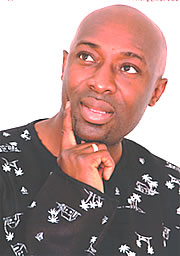
Where do Fuji musicians go to learn their act? This place and that place. But how do you rate one who started singing from three years old. At 45, Adewale Ayuba Saliu Okeola, better known as Adewale Ayuba is arguably the first Fuji musician who is a graduate. His fascination with the ivory tower tallied with an early ambition to reach the pinnacle of his act.
Convinced that his acceptance by the university community would bring about a good turning point for Fuji music, Ayuba made up his mind to break into that circle with his music. Having found the recipe for a new bubbly kind of Fuji that settled in well with the youths, Ayuba began his climb to the top. Now, he is eager to be remembered as the one who opened the door of acceptance for Fuji musicians in the universities and among the educated.
At the age of three, many children are just beginning to learn ABC and counting 123 in their first formal lesson of life. Adewale Ayuba did more. He was also singing Do-Re-Mi. and at the age of seven, he was a professional musician, putting together other children to form a band. This was way back in the land of his birth-Ikenne in Remo, Ogun State.
He was in Primary Two, actually, he could be described as the band leader, holding the top shots for one Sunday who discovered the musical endowment in the young Adewale and sought to encourage his talent by investing in him. Mr. Sunday bought the equipment with which Ayuba started his trade in music.
Naturally, the band took the first names of the two frontliners, becoming known as the Sunny Ayuba Band. His parents, particularly his father would have none of this. It became a hard battle; however, Pa Ayuba was reasonable enough to allow his son a cautious entry into world of showbiz. All he wanted was a promise to face his studies, which the young man readily agreed to. So between Mondays and Fridays, he obeyed his father by remaining in school. Weekends were times to honour whatever engagement Mr. Sunday had arranged.
His education was not affected. His father was happy. Sunday made good returns on his investment; and to Ayuba, matter didn’t matter. He was satisfied with whatever he was given. The additional peck of fame and recognition that followed put his head in the cloud. It was alright to be the pupil and the kid who got most talked about everywhere he went. That was about 35 years ago.
It would take another six years before his first album surfaced. So, when Ayuba talks about his years in music. He situates it around the issue of his first album 21 years ago. One of the landmarks that year was the death of Dele Giwa through a parcel bomb. Ayuba’s song may not have captured that momentous happening, but it was earth- shaking enough to make him remember; so this year, he was talking about 22 years of making good music.
The album was released on Success Records owned by Tijani Akinlaja. Ayuba has since moved to many labels, including a memorable stay at Ivory Music, but through the years, he has not forgotten his mentor. He keeps in touch with him. He has recorded 15 albums in Nigeria and four albums internationally. Some of the companies he has worked with include Premier Music, Corporate Records, Joat Records and Lati Alagbada records.
At 45 years, Ayuba can look back on those heady days of his humble beginning and give thanks to God for giving him a talent that has taken him from grass to grace to the height of the world stage. It has been a long, eventful road from Ikenne. His first stop on the way to stardom was in Lagos , which he arrived at for the first time in1980.
“Before I finally moved to Lagos , I normally came to Lagos every Sunday and I moved finally to Lagos in 1983. I am talking about when I had an accommodation and made my final move from Ikenne with my 20 band boys. It was difficult. My boys had no where to live in Lagos. I slept in a friend’s shop in Lagos Island . He was a fashion designer. My boys went around in the day, at night we slept in that my friend’s shop”
“The business of music that they came to Lagos for didn’t exactly start happening the next day. For a long while, all we survived on was to play at children’s naming ceremonies, house warming. At one of those events, Akinlaja, Owner of Success Records hit it off with Ayuba and there began a relationship that saw the birth of five albums, between 1985 and 1989. In 1990, the tide of his life changed for good, when he joined CBS.
It was also time for him to take a studious look at the music scene. He refused to be rushed into the studio to record any album. He was worried that Fuji , his genre was not patronized by the university community and the elite.
Ayuba also informed that he used to travel abroad to perform for three months and more. “We left Nigeria then and something happened and we couldn’t come back” But it was a period that he would never regret. Many good things happened to him during that period. “I was able to get my Green card in America . I also took time out to go to school. I was in Queen Borough community college. I was there for two years, studying banking and finance. I have an associate degree in that discipline. It is a two year course. One more thing that Abacha did for me that I will never forget is that I met my wife in school in the US . My wife is Igbo. She is from Onitsha . I met her in New York . Her name is Azukaego Kwentoh. I did not set out to marry a non Yoruba; I just prayed to have my wife.”



















